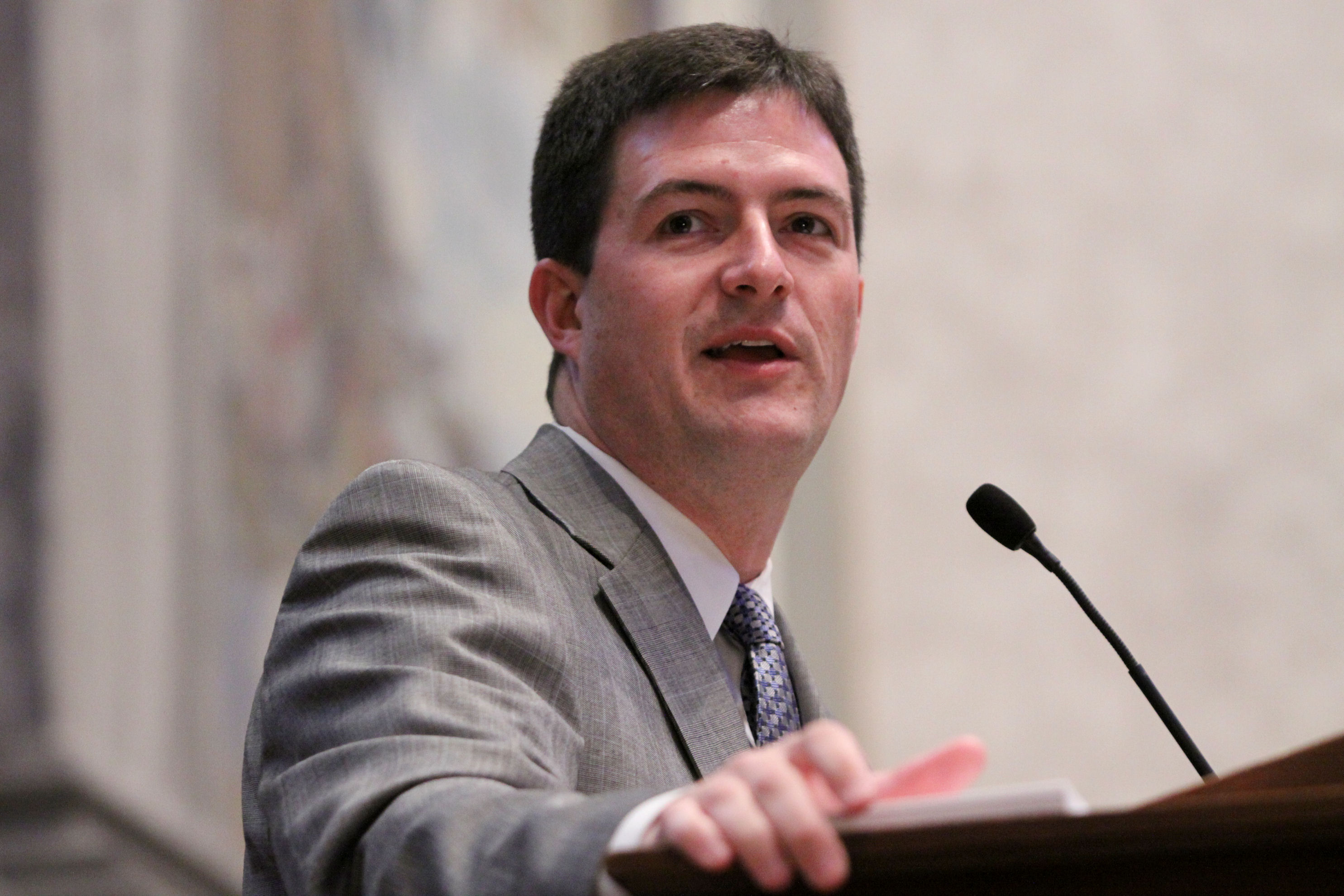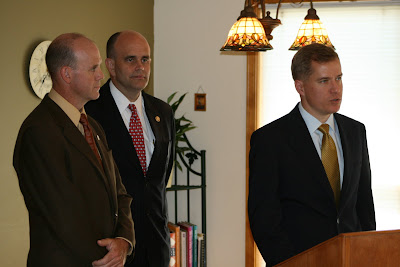Property Tax Reform
For the first time in nearly 30 years, the Missouri General Assembly has passed legislation that will reduce real property tax rates through roll backs of levies, bring transparency to the property tax levy system, and provide more efficient appeals procedures for taxpayers. This is the first legislation to significantly reduce real property taxes since the county sales tax was authorized in 1979, requiring counties to rollback their levies in amounts equal to the new sales tax revenue they would receive from the county sales tax.
Throughout the process, Associated Industries of Missouri and the NFIB were the only two general business groups supporting the bill. We supported the positive changes contained in the bill that will benefit employers in Missouri. We applaud Senate President Pro Tem Mike Gibbons, and congratulate him on passing SB 711.
Many of our members have been upset with the drastic increase in their tax bills resulting from the reassessment of the value of their property every two years without a simultaneous roll-back in tax rate. Because all taxing districts are not required to roll-back their rates, employers and other taxpayers receive astronomical increases in their property tax bills. One of our members noted an increase of more than 30%!
SB 711 will require taxing districts to roll-back their rates. It will also bring transparency to the property tax system by requiring taxing districts that want additional tax money to adopt a policy statement, ordinance or resolution explaining tax increases in non-reassessment years. The bill also requires taxing districts to play fair with taxpayers by requiring tax increases to be adjusted so they reflect the amount of assessed tax that would be equal to the assessed valuation in effect at the time voters adopted the tax increase multiplied by the new tax rate. The current system allows an automatic double dip tax increase because the tax increase is adopted and then applied to the higher assessed valuations resulting from reassessment. The bill also clarifies procedures that must be followed when taxpayers appeal property tax assessments.
The bill returns some accountability to the real property tax assessment system. Associated Industries of Missouri is proud to have supported this legislation from introduction through final passage and look forward to Governor Blunt’s signature on the new law.
Defense Sales to Foreign Governments
Associated Industries of Missouri was proud to support legislation codifying the exemption of sales of items on the federal munitions list from state and local sales taxes. Only items on the federal munitions list are included in the exemption and it applies to the sale of such items to foreign governments.
Efficiency in Government
AIM asked Representative Shannon Cooper to file our bill to eliminate wasteful and unnecessary certification of pollution control equipment for sales tax exemption purposes. Rep. Cooper agreed and, thanks to his strong leadership, the legislation passed the General Assembly by nearly unanimous votes in both the House and Senate.
The bill is the product of ongoing meetings the AIM/TRIM Tax Committee has conducted with the Missouri Department of Revenue. Through these meetings, and subsequent meetings with the Department of Natural Resources, we found the certification of this equipment was completely unnecessary. We took action to eliminate the red tape, saving money for employer taxpayers directly and, because we are eliminating an unnecessary duty for government, the bill will save all taxpayers money. If approved by Governor Blunt, taxpayers will no longer need to seek certification of air and water pollution control equipment before receiving exemption from sales tax.
Again this year, Associated Industries of Missouri supported legislation that would send to voters a proposal to amend the Missouri Constitution to limit the amount that may be spent by state government. While the proposal bears some similarities to the Hancock Amendment, that amendment only addresses the amount of revenue that may be collected from taxpayers. This new amendment would limit the amount that could be spent by state government and move any excess revenues to savings accounts for use in leaner budget years, protecting the state’s ability to provide necessary services. If enough money is put back in these funds to adequately provide for future service needs, the balance would be used to provide tax relief for all taxpayers. This legislation did not survive the legislative process this year, but was passed by the House and was approved by a Senate committee. We will continue to press for improvements in the way the state government handles your tax dollars.
Economic Development Legislation
Associated Industries of Missouri supported the concepts of mega projects legislation, providing tax incentives to large employers that choose to locate in Missouri. This legislation was specifically drafted to attract a large airplane manufacturer from Canada to the Kansas City area. AIM supported the concept of the plan, but allowed the legislators latitude to determine the details of the deal. In the end, the terms of the deal were adjusted to provide that the company will not receive any benefits until five years after the initial deal, the incentive will be based on a percentage of payroll that is actually created, and the incentives must be repaid through sales of aircraft produced at the facility.
AIM also supported the major economic development bills that were also passed in the legislative session, providing a $20 million increase in the Missouri Quality Jobs program tax credit limitation. The Quality Jobs program is used by existing Missouri employers that are expanding and benefits are available for small companies, high tech companies, and high impact projects. Employers must create a minimum number of jobs paying at least county average wage and provide health benefits for employees in the new jobs. The Taxpayers Research Institute of Missouri compiled a report on the results of the program last year and found that at least $3 in tax benefit is reaped from each tax dollar invested in the program, making the program a win-win for employers and state and local governments, as well as the workers in the new jobs. The bill would also revive the job retention tax credit and that credit would expire in 2013.
Also included in the economic development bills were increases in the tax credit limits for Enhanced Enterprise Zones, maintaining an increase in the Development Tax Credit, and several other items that are important to current and future Missouri employers.
Entrepreneurial Development Council
This bill helps protect small businesses that have developed new products or processes from having their ideas stolen by interests that have a greater ability to afford litigation expenses. This cutting edge legislation could make Missouri the first “entrepreneur-friendly state” – a state that helps its corporate citizens, no matter how small, protect their intellectual property such as patents, copyrights and trademarks. The protections provided by the legislation will encourage innovation in Missouri.
The fund created in HB 2058 could be used for legal defense of intellectual property owned by registered entrepreneurs and for low interest loans and grants to support those entrepreneur’s new products.
Associated Industries of Missouri was the only statewide employer group supporting this legislation, joining universities and economic development groups in the effort. We thank Senator Frank Barnitz and Representative David Pearce for working together in passing this legislation that will help protect Missouri-born intellectual property.
Voice Over Internet Protocol (VoIP)
In response to increasing competition in voice communications and ever-changing telecom technology, legislation was passed to update Missouri laws and allow Missouri consumers to receive the full benefit of competition in the Voice Over Internet Protocol (VoIP) field.
Associated Industries of Missouri supported the bill that was prompted primarily by the need to respond to changes caused by new Internet technology and services that affect all voice providers. The legislation removes from state law barriers to competition between providers of voice services.
Wood Energy Tax Credit Sunset
Senator Brad Lager introduced legislation to sunset the Wood Energy Tax Credit in 2010. We brought together members of the industry to meet with Sen. Lager and were successful in convincing him to extend the sunset by three additional years. The Wood Energy Tax Credit provides an economic incentive to recycle wood byproducts and is used by charcoal producers and others. The charcoal producers are usually found in more rural areas of the states and the jobs provided by those operations are extremely important to local communities. AIM also solicited the assistance of Senator Frank Barnitz as he has one of these facilities in his district and he was extremely helpful in achieving this victory. The Wood Energy Tax Credit will now expire June 30, 2013, provided HB 2058 is signed into law.
Research and Development Tax Credits
Associated Industries of Missouri worked to reinstate a research and development tax credit that had previously expired, but that legislation was not successful this year. AIM will support this effort in the future. But even more importantly, AIM will introduce legislation in the next legislative session that will provide a more comprehensive research and development tax credit – one that will recognize and encourage research and development activities of all companies in a manner similar to the federal research and development tax credit. We worked diligently with experts in our membership and legislative sponsors, but were not able to develop language in time to pass the legislation this session.
Defense Pays Off
Everyone knows defense is important to our legislative efforts every session. This year was no exception. For example, one Senator introduced a bill to decouple from the federal accelerated depreciation that was included in the most recently approved economic stimulus package. We worked hard behind the scenes to successfully thwart that effort, meaning Missouri employers will now be able to fully enjoy the benefits of the accelerated depreciation when calculating their federal and state income tax liabilities.
We were also successful in convincing groups to drop their effort to remove the local use tax exemption that was provided in last years’ AIM/TRIM Manufacturing Inputs Exemption. While well meaning, the effort would have resulted in a tax increase to Missouri manufacturers and we were successful in defeating that effort.





















